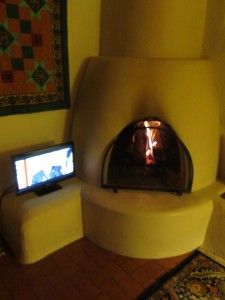This story begins in a downstairs powder room in a mansion in Casablanca. I was in that powder room in the U.S. Ambassador to Morocco’s residence in the mid-‘90s, doing more than powdering my nose, when I noticed a framed poem on the floral-wallpapered wall. No doubt a line formed outside the door as other members of our party of New York food writers waited to pee, while I copied the whole poem into my ever-handy notebook, knowing I would always treasure these wise words:
Travel light in life.
Take only what you need:
a loving family,
good friends,
simple pleasures,
someone to love,
someone to love you,
enough to eat,
enough to wear,
and a little more than
enough to drink –
for thirst is a dangerous thing.
— Unknown
I’ve been thinking about this poem a lot lately as I prepare to travel on. Later this year I plan to move to the central mountains of Mexico, where the weather is like year-round springtime and my meager retirement income is likely to go farther. I know I’m not alone in this hegira: Thousands of Americans of retirement age are, as I write this, pulling up roots, packing up their belongings, purging themselves of accumulated “stuff,” and moving on – to wherever they feel will better suit this new stage of their lives.
The immediate, daily questions I face as I prepare to join this migratory flock are: What to take? What to store? What to give away? What to toss? What has value? What is worthless? I pick up items and stare them down, thinking, Can I live without you? In most cases, the answer is yes. I delightedly donate to charity clothing I seldom wear, secretly hoping to see my decent old sweaters and jackets on locals passing me by. Ten years’ worth of college English teaching has provided mountains of papers with which to start nice warm fires in my kiva fireplace this winter.

Items I’d planned to leave my daughter and grandchildren when I die have been shipped to them while I’m still alive. Why should they have to wait? I may be around awhile.
I’m keeping the bare necessities, the things that make me happiest: my favorite books, of course, as well as notebooks, pens, cooking and quilting gear, art supplies, light clothing, summer shoes. I’ll take this computer, too, not because it makes me happy but because it’s become a necessity. I plan to travel light and take only what I need.
Too many things tend to weigh Americans down, don’t they? When I lived in Africa – for a total of seven years of my life – I observed with a tinge of envy how lightly Africans travel through life. Their lives, it seemed to me, embody this wise “Travel Light” poem; they value the simple pleasures, the human connections, more than material possessions.
I tried to learn from them and emulate them when I returned to the States in 2001, but I’ve found it’s close to impossible to do so in our culture. Within days of my return, I had to invest in a car and a computer, weighing me down with thousands of dollars of debt. Then I needed to invest in an additional degree to qualify to teach at the college level. Before long, I felt as if I were wearing cement shoes.
In the chapter “Letting Go” in her wonderfully wise book The Gift of Years, Joan Chittister refers to this stage of life as “divestment.” She says:
“[I]t is the spiritual essence of a person that emerges from the natural divestment that comes with old age. Life, it seems, follows a relentless cycle: in our early years we accumulate, but in our later years we divest. Both of them have a place in life. Both of them are a struggle. Both of them are liberating. … Into this [latter] part of life we travel light.”
At the end of this chapter Chittister uses the word “lightfootedness.” I like that. I hope to travel – and walk – lightfootedly in Mexico.
